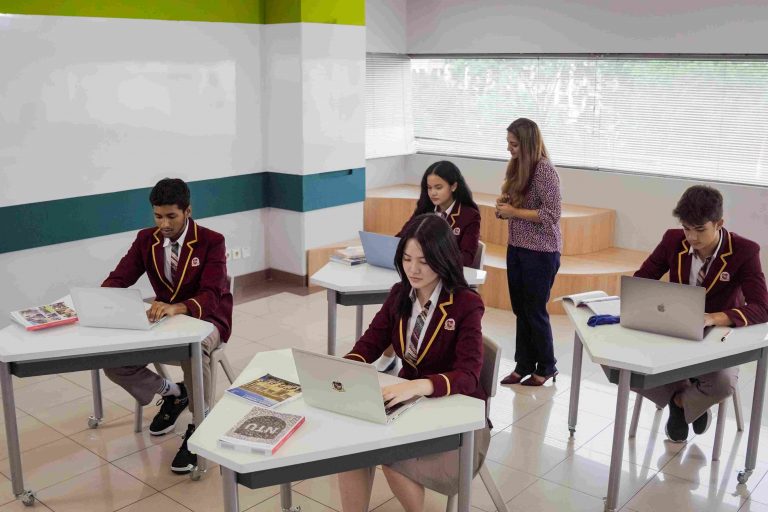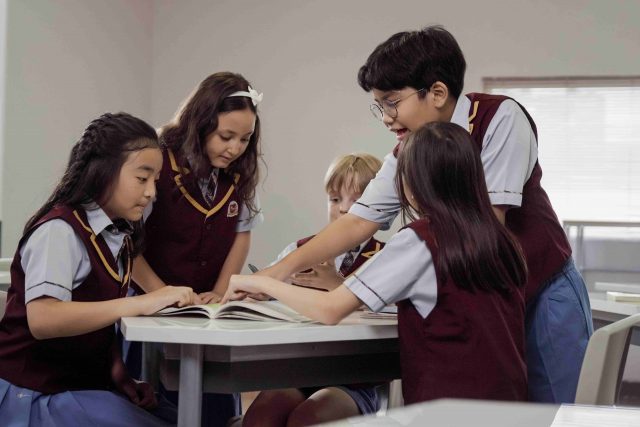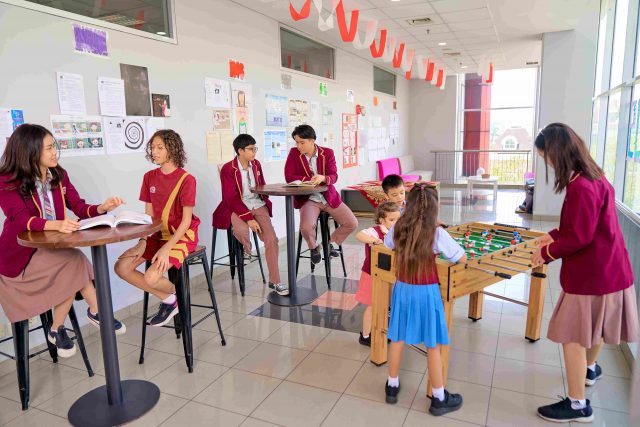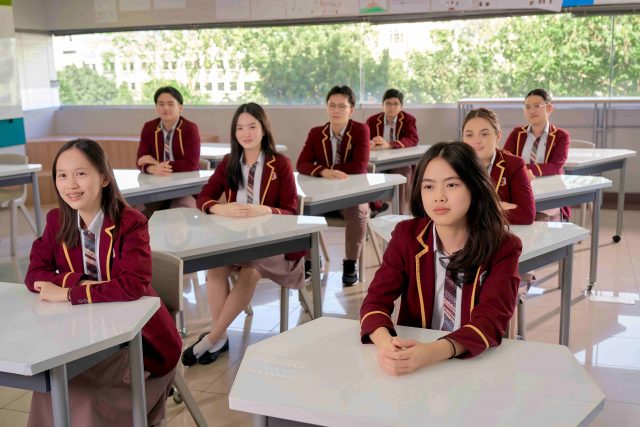MYP Individual and Societies Guide

When embarking on a journey of holistic development, the individual and societal components play a pivotal role in shaping children to navigate the complexities of our world. Therefore, schools and parents should learn about the MYP Individual and Societies Guide.
This is a part of the Middle Years Programme (MYP) of IB (International Baccalaureate), which is a programme designed for students in their middle school ages, fostering intellectual curiosity and global citizenship.
Programme Model of MYP Individual and Societies
In the IB curriculum, the Programme Model of MYP Individuals and Societies encompasses a comprehensive framework designed for students aged 11 to 16. This model emphasizes the development of critical thinking, creativity, and reflection.
This programme is adaptable to various national or local curriculums and builds upon the foundations laid by the IB Primary Years Programme (PYP). It equips students to tackle the academic rigours of the Diploma Programme (DP) and the Career-related Programme (CP).
Meanwhile, the key features according to the MYP Individual and Societies Guide include:
- Comprehensively attends to students’ intellectual, social, emotional, and physical welfare.
- Offers avenues for students to cultivate the necessary knowledge, attitudes, and skills to navigate complexity and assume responsible roles in the future.
- Guarantees a thorough comprehension across eight subject groups.
- Mandates the study of a minimum of two languages to aid students in appreciating their own cultures and those of others.
- Encourages student involvement in community service.
- Aids in readying students for advanced education, the professional sphere, and continuous learning throughout their lives.
The Nature of Individuals and Societies
The Nature of Individuals and Societies encompasses a holistic understanding of human interactions, cultures, and environments. It delves into historical, geographical, political, economic, and cultural factors shaping societies globally and locally.
This interdisciplinary approach fosters critical thinking and empathy, encouraging students to explore diverse perspectives.
Through inquiry and investigation, learners analyze real-world issues, developing skills to navigate complexities and contribute responsibly to their communities.
Individuals and Societies Across the IB Continuum
According to the MYP Individual and Societies Guide, within the continuum of international education, the MYP individuals and societies seamlessly bridge the gap between primary and diploma programmes.
Through a continuum of learning, students delve into disciplines ranging from history and geography to economics and philosophy, preparing them for academic rigour and lifelong inquiry. It encourages students to explore cultural, social, and environmental factors.
Aims and Objectives of MYP Individual and Societies
The aims of MYP Individuals and Societies are to:
- Foster appreciation for human and environmental diversity.
- Understand interactions between individuals, societies, and the environment.
- Comprehend the functioning and evolution of human and environmental systems.
- Develop concern for community well-being and environmental preservation.
- Encourage responsible citizenship in local and global communities.
- Cultivate inquiry skills for conceptual understanding of societal and environmental relationships.
Meanwhile, as written in the MYP Individual and Societies Guide, the objectives encompass diverse dimensions of learning, including:
- Knowing and understanding: Attain factual and conceptual knowledge, express concepts effectively.
- Investigating: Develop research skills, craft clear research questions, assess information
- Communicating: Master diverse media to articulate ideas effectively and cite sources accurately.
- Thinking critically: Analyze, synthesize information, interpret perspectives, and evaluate sources critically.
Interdisciplinary Learning of MYP Individual and Societies
The MYP Individual and Societies Guide from the International Baccalaureate programme also highlights about fostering connections between subjects like history, geography, and economics.
Also, interdisciplinary units encourage collaboration, problem-solving, and a deeper understanding of global issues. In this subject area, students might explore various interdisciplinary topics, such as:
- Investigating the historical and geographical backgrounds of scientific and design breakthroughs.
- Examining the political, cultural, and social meanings behind artistic expressions.
- Analyzing statistics and mathematical models to understand social phenomena.
MYP Individuals and Societies Projects
Individuals and societies in the MYP programme offer numerous learning opportunities through action. Projects inspired by individuals and societies may include investigations into:
- Entrepreneurship, business, and economic matters
- Propaganda, persuasion, and the influence of modern social and mass media
- Challenges in human and physical geography, both local and global
- Stereotypes, identity, values, and adapting to cultures
- The historical evolution and influence of noteworthy individuals, groups, or concepts.
What Are the Key Concepts of Individuals and Societies in MYP?
The key concepts in the IB help shape a diverse curriculum, focusing on major ideas relevant across different subjects. They encourage links within the individuals and societies group and beyond:
- Exploring topics like change and community (intra-disciplinary learning)
- Connecting with other subject areas (interdisciplinary learning)
Here are a list of core concepts in the MYP:
- Time, place, and space
- Systems
- Relationships
- Perspective
- Logic
- Identity
- Global interactions
- Form
- Development
- Culture
- Creativity
- Connections
- Communities
- Communication
- Change
- Aesthetics
However, the MYP Individual and Societies Guide only highlights several key concepts, including change, global interactions, systems, and time, place, and space.
Related Concepts of MYP Individuals and Societies
The related concepts in this programme aid in deepening understanding, rooted in specific disciplines, supporting in-depth exploration. These concepts may stem from unit subject matter or subject craftsmanship.
Overall, the individuals and society subject group encompasses various disciplines, allowing for diverse structuring of student experiences. However, modular courses can tailor related concepts to central disciplines per unit. Here are the concepts:
- Economics
- Geography
- History
- Integrated humanities (derived from economics, geography, and history).
Meanwhile, suggested related concepts for additional disciplines in this programme may include:
- Business management
- Philosophy
- Psychology
- Sociology/Anthropology
- Political science/Civics/Government
- World religions.
Statements of Inquiry for MYP Individuals and Societies
Statements of inquiry frame classroom exploration within broader conceptual contexts, fostering deep understanding and critical inquiry. Here are some examples of inquiry statements for MYP individuals and societies:
- Local beliefs shape how we see globalization’s effects.
- Alliances between nations safeguard various interests.
- Where things are affects how people and economies grow.
- New technology brings both opportunities and challenges for different cultures.
- Dealing with hazards and disasters requires long-term strategies.
- Societies can embrace, change, or reject big ideas.
MYP Inquiry Questions: Types and Examples
Inquiry Questions for MYP Individuals and Societies
Also, teachers and students use inquiry questions to guide their learning. These questions help focus teaching and organize learning experiences. Here are some examples of MYP individuals and society units:
- Factual questions
- What were the main causes of the French Revolution?
- Who were influential Enlightenment thinkers, and how did they shape the US Constitution?
- Conceptual questions
- What is the connection between revolution and violence?
- How does political revolution impact ordinary people?
- Debatable questions
- Can a single person change the world?
- Are revolutions a natural part of human history?
Assessment Tasks of MYP Individuals and Societies
In the MYP Individual and Societies Guide, assessment tasks often include tests, exams, research leading to essays, and various oral, written, and multimedia assignments. Here are the examples:
- Assessing Objective B: Investigating
Essays, research papers, problem-based learning scenarios, web quests, fieldwork, and role plays.
- Assessing Objective C: Communicating
Written reports, slide show presentations, cartoons, animations, oral presentations, podcasts, maps, storyboards, diagrams, flow charts, databases, websites, multimedia, and videos. Visuals include diagrams, charts, maps, timelines, and tables.
Assessment Criteria of MYP Individuals and Societies
Assessment for individuals and societies courses throughout the programme follows specific criteria, with four equally important assessment standards:
- Criterion A – Knowing and understanding: Maximum score of 8
- Criterion B – Investigating: Maximum score of 8
- Criterion C – Communicating: Maximum score of 8
- Criterion D – Thinking critically: Maximum score of 8
Subject groups must evaluate all aspects of these four assessment criteria at least twice each year in the MYP.
If you are seeking more information about the MYP Individual and Societies Guide, BINUS SCHOOL Simprug is the solution that offers a renowned International Baccalaureate Programme for your children.
IB Skills MYP and Approaches to Learning
Referensi:
https://www.nesinternational.org/school_policies/individuals_and_societies_guide.pdf
https://www.linkedin.com/pulse/engaging-minds-exploring-key-concepts-ib-myp-individuals/




